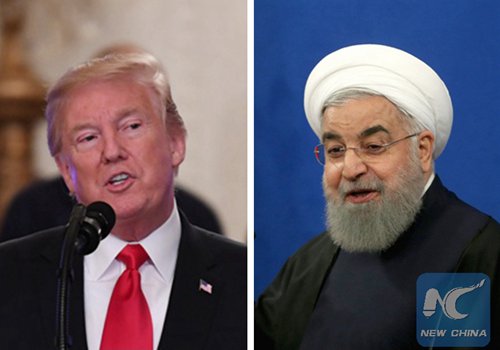HOME >> OPINION
US trying to fish in troubled Gulf waters
Source:Global Times Published: 2019/7/23 20:58:41

Photo: Xinhua
The oil tanker crisis between Britain and Iran should not be seen as a confrontation between the West and the Islamic Republic as Britain cannot represent the entire West. The US has been stoking tensions with Iran over the nuclear issue, but many Western countries have different stances - they are generally defending the current Iran nuclear deal.
The future of US-Iran tensions depends on US moves. If the US dare not escalate tensions in the region, the UK won't crank up the pressure. One possible reason for Britain seizing Iran's vessel is to gain more post-Brexit support from the US because Britain doesn't want to lose favor with EU's diplomatic strategy and become isolated.
Britain seized Iran's tanker on July 4 without much rhyme or reason and got the backing of few countries. A tit-for-tat response by Iran - the seizing of a British-flagged tanker - is logical for Tehran, which has been refusing to give in to Washington for decades.
However, although Britain is holding the Iranian tanker, the country hasn't changed its stance of defending the nuclear deal.
Hence, the tanker seizure is not the leitmotif of tensions in the Gulf. The game between the US and Iran is.
The US was trying to form a military coalition of allies to escort the tankers in the Persian Gulf. All this has come about as tensions between Washington and Tehran peak and the situation could spiral out of control if there is further escalation. Such being the case, US President Donald Trump doesn't want to risk muddling the waters of the Gulf. If the situation runs out of control, it could affect his reelection campaign.
However, faced with a tit-for-tat Iran, the US cannot raise the white flag. Therefore, the US wants to mobilize support of other countries. The coalition is more symbolic than pragmatic as Iran is not capable of destroying the shipping route in the Gulf.
Six oil tankers have been attacked since May, in or near, the Strait of Hormuz but it has not been proved that Iran is responsible. If countries such as the US, Israel and Saudi Arabia have solid proof, they would have made it public long ago to pressure the Islamic Republic.
Besides, it would be foolish of Tehran to spark international outrage at this stage, unless Washington pushes it into a corner, leaving it with no choice but to ratchet up tensions by measures like closing the Strait of Hormuz.
Quite a few Western countries still have confidence in Iran. Tehran also hopes to have their back. Many countries disagree with the US, but if Iran attacks ships in the Gulf, it risks losing support.
The US provoked the confrontation with Iran but it doesn't want to be stuck in the mire. However, things didn't go Washington's way.
Trump wanted to end on a high note. He said several times that he wanted to talk to Iran and asked countries like Japan to mediate. But some of Trump's aides and staff, such as White House National Security Adviser John Bolton and US Secretary of State Mike Pompeo prefer a tougher stance against Iran.
Meanwhile, even if the US continues to raise the heat on Iran, it can't expect Tehran to yield as hard-liners in the Gulf nation would push back against any capitulation. Iranians are sort of disappointed over the fact that Iran's current government once believed that the US would withdraw its sanctions after the nuclear deal was signed. But the truth is, after Trump took office, he stepped up sanctions rather than reduce them. So, Iranians won't allow their government to give in.
Amid tensions with the US, Iran on Monday reportedly captured 17 spies working for the US Central Intelligence Agency and some of them have been sentenced to death. The nationality of the suspects was not revealed. This can be seen as a reaffirmation of Iran's tough stance on the US as well as a message to the Iranian people that their government won't relent in the face of the US.
Under the situation, the role of a third-party - such as signatories of the Iran nuclear deal, the International Atomic Energy Agency (IAEA), and UN - could be significant. The IAEA and UN have recognized the legitimacy of the Iran nuclear deal, while the EU is working on a mechanism to avoid US sanctions to economically assist Iran. These measures will help, but cannot quench Iran's thirst as oil export is crucial for the country.
The Iran nuclear issue hasn't run into stalemate. It is not becoming more severe or going out of control. Different powers are striving to mediate although their efforts haven't come to fruition.
The article was compiled by Global Times reporter Xu Hailin based on an interview with Li Weijian, a senior research fellow with the Center for West Asian and African Studies, Shanghai Institute for International Studies. xuhailin@globaltimes.com.cn
Posted in: VIEWPOINT